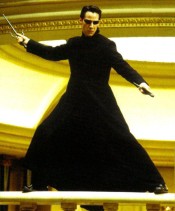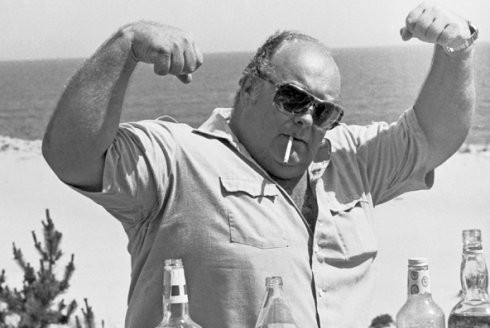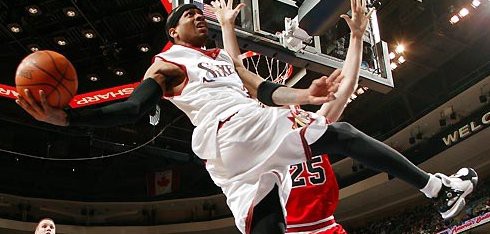Slurry With The Fringe On Top
There’s A Fetish For Everything (A Continuing Series): “A man with a sexual fetish for slurry has been jailed after breaching a restraining order banning him from a farm. David Truscott, 40, broke into a farm, covered himself in the waste and was seen masturbating, a court heard. He was caught just weeks after he was released from a previous prison sentence for a similar offence.” [Via]
Republican Poll
Republicans cannot find consensus on the direction of their party, but they can pretty much all agree that they hate President Obama and the Democrats, “with nearly all dissatisfied with the administration’s policies and almost half saying they are ‘angry’ about them.” Weird. You never think of those guys as the angry types.
Leno Show Less Palatable Than Whatever CSI You Taped Earlier
People would rather spend the 10 PM hour watching previously DVR’d recordings than watching Jay Leno. Other things people would prefer to watch to Jay Leno include empty fishbowls, leaky faucets, and the thermostat.
Staring Into The Abyss: A Frightening Glimpse Of The Future

Somewhere down in the Flatiron, out in Brooklyn, over in Queens or up in Harlem, cabals of bright young things are watching all the disruption with more than an academic interest. Their tiny netbooks and iPhones, which serve as portals to the cloud, contain more informational firepower than entire newsrooms possessed just two decades ago. And they are ginning content from their audiences in the form of social media or finding ways of making ambient information more useful. They are jaded in the way youth requires, but have the confidence that is a gift of their age as well.
That’s David Carr, in his weekly media column, discussing the industry at present and in future. The column is vague in the way that the future of the media is vague — we all think we know how things might shape up but none of us are really sure-but it also contains what feels like the kind of forced optimism we all keep reminding ourselves to feel during These Troubled Times. Plus, it is an easy set-up for the Matrix joke, and who doesn’t love that?
I have been in a slightly philosophical mood of late. Perhaps it is due to the change of seasons, the closing out of what’s been a difficult and frustrating year. My mind generally operates in a fairly discursive manner, so my thoughts are perpetually ajumble (Not a word? It is now.) and non-specific, but here is what I’ve been thinking about.
This generation, our generation — and you know who you are — is at the dead center of a profound transition in the way we process information. This is not by any means an original observation, but I’m not sure that enough attention has been paid to those caught in the middle. For my parents and those who are older, it is too late. They will cling on to the old ways of thinking and knowing and will probably be relieved to die without having to make the switch, particularly since they can see where we’re all headed and it has absolutely no appeal. For the kids who have grown up plugged in, they know no other way, so they are spared the difficulties of change. They look at the old folks, or even the slightly-older-than-they folks with a mixture of idle curiosity and derision.
But what about us? We were brought up reading for totality. Sure, we were taught to grab the vital bits and pieces as necessary, but there was more of an understanding that a complete text was its own reward, and either by osmosis or unconscious analysis, the necessary information would implant itself within us. These days we’re trying to absorb everything new, everything that comes at us in endless waves, with a sorry combination of old tools and an unsettled and slightly faulty concept of the new ways in which words signify and convey. The most successful of this cohort will be those who are able to separate themselves from the lessons we were taught at the start and adopt the new methods while carefully maintaining previous understandings, but knowing when to avoid those understandings lest they interfere with the new process.
Does that make sense? Probably not. I am writing this for the Web (the driver, after all, of the new way) so my arguments are untested and my assertions are like Italian seaside resort construction — put up fast with cheap material on shoddy foundations. Then again, you are reading this on the Web, quickly scanning for relevant nuggets — good luck with that! — and automatically skipping typos or filling in missing words. We have this new agreement, you and I, that cogency and authority are no longer subject to the once-standard necessities of clarity and completeness.
There was once a time in this country where Roger Miller was able to have his own variety show on one of the three major networks. (There was once a time in this country where there were three major networks.) I love Roger Miller, but that is a baffling fact to me, that this country once thought itself so uniform in its tastes that Roger Miller was a viable television host. And that’s me looking back at a time not a decade before my birth and being baffled by it. Can you imagine how this new generation will look back at, I don’t know, “Friends”? Or The Matrix?
Oh, right, the Matrix joke: The Matrix joke is something I do pretty much just to annoy my acquaintances. If I’m not in a mood for deep thinking — and if the Google era has done anything, it’s given me a perpetual lack of interest in deep thinking — I simply respond to anything that threatens to get thoughtful or profound with a learned nod and say, “It’s just like The Matrix.” Try it, it works with pretty much anything: From Mark Sanchez’s color-coded wristband to Joe Biden’s insistence on riding Amtrak each day, you can make everything sound like a Matrix scenario. I think it’s because we’re all so dependent on routine but none of us wants to admit it. Everyone likes to think that they’re Keanu Reeves, when, really, we’re all a bunch of, uh, some other guy from The Matrix who is not Keanu Reeves. (But not Larry Fishburne, he was pretty badass.)
And what of that cabal of bright young things who are watching all the disruption with more than an academic interest? Who is more Matrixy then they? If the future, as I suspect, is one of less gaudy but more frequent rewards — call them microrewards — who will have time to unplug, to read for pleasure, to think deeply? Change, it seems, is a forced march to small payouts for brief efforts.
But I could be wrong. I usually am. I was walking to the Awl offices this morning and I saw a poster for Lady Gaga’s Fame Monster. As you know, I have found the success of Lady Gaga not only inexplicable but almost personally offensive. Like, they’re making Lady Gaga a superstar to spite me, Alex Balk, because I cannot understand her at all. The entertainment industry is sending me a signal that I have now aged out of anything they might be interested in providing me. This morning, however, gazing briefly at that poster — it shows two iterations: her blonde version and then the dark-haired version with the fucked-up makeup — it suddenly all became clear: Lady Gaga is dance music’s version of Marilyn Manson. People from every generation want pretty much the same things, just in contemporary packages. So maybe there’s hope. Or maybe that’s more forced optimism. All I know is someone has probably already made the Gaga/Manson comparison, but I’ll be fucked if I’m going to Google it to check. Because I am old, and sometimes the old ways really are the best ways.
Bizarre 'No Problem' Obsession Persists

The New York Times continues its inexplicable war against the phrase “no problem,” which we noted last week. Asked an apparently very bored reader of the Styles section, to the Social Q’s column: “Have you noticed that young people are substituting the phrase ‘no problem’ for ‘you’re welcome’?” The useless answer: “Take a common transaction: I pass you the milk. You thank me. I reply: ‘No problem.’ Well, of course it’s not a problem! It’s a common courtesy.” Oh, these young people and their highly offensive slang!
The Tragic Tale of Bunky and Barbara Hearst

Ever since American courts granted corporations the legal status of persons-in the most woeful misapplication of the 14th Amendment’s due process clause prior to the imbecilic Rehnquist court ruling in Bush v. Gore-the traditional upper-caste battle royale over a robber baron’s legacy has been an especially fraught family matter. Should a litigating person qua person emerge triumphant, a carefully constructed family ownership trust can become the plaything of a crass interloper, in no way to the manor born. Company assets and proprietary business plans can turn into just more fodder in courtroom campaigns of personal destruction-as carelessly repurposed and quickly tossed away as one of Larry King’s elective affinities or a U2 concept album. That, at any rate, is the plain moral of the harrowing tale of John Hearst’s divorce, as recounted in Fortune writer Mark Fass’s epic reconstruction of the sordid drama, Citizen Bunky.
John, the once-boyish grandson of the maniacal yellow-press baron William Randolph Hearst-nicknamed “Bunky” by Washington Redskins owner George Marshall, who found him a dead ringer for the baby-hero of a 1920s comic strip-is among the 13 fortunate souls presiding over the Hearst Family Trust. The Trust conveniently also makes up a stolid majority of the Hearst Corporation’s board of directors. This clannish overlapping directorate was the brainchild of Big Daddy Hearst, who was determined that his blood descendants should lord over the sprawling Hearst empire with the same iron fiat that he enjoyed. When Patty Hearst was kidnapped by the Symbionese Liberation Army in 1974, guardians of the Hearst holdings won the right to quarantine the identities of the lead trustees as well as most of their fiduciary doings, on the theory that publicizing such information would grant a virtual blueprint for other scheming scion-abductors.
As a result, Fass notes, the Hearst corporation “is almost certainly the largest company managed by trustees”-a much more tightly-held family property than, for instance, the media trusts maintained by the Sulzberger and Graham clans, which mix publicly held stock with the voting shares controlled by the heirs to the respective family fortunes that preside over the New York Times and Washington Post. So when Bunky’s third marriage-to Barbara, a former Hamptons-cruising photo stylist who had formerly been in hock to the IRS for $50,000-went fabulously asunder in 2004, much more than the Hearst legatee’s sense of amour propre was at stake.
Although Bunky’s share of the Hearst empire was a nominal 5% (yielding some $9 million in annuities), still the jealously guarded family-cum-company secrets threatened to spill over into the increasingly ugly court proceedings. That would expose to unwonted public view the financial arrangements behind more than 200 Hearst-owned magazines (including Cosmopolitan, O the Oprah Magazine, and the scion-friendly monthly that Bunky commandeered through most of his nominal working life, Motor Boating), 16 newspapers, 29 TV stations, the Arts and Entertainment cable channel, and 20% of ESPN.
At first, no such threat seemed imminent. Bunky initially tried to smite down Barbara’s robust proposed settlement of shared assets via the tried-and-true adultery tactic-a claim that soon caromed through tabloidland. Bunky’s allegation was that Barbara had been on the scene and in flagrante when a neighbor dropped dead. The neighbor was found naked in his bedroom under the influence of a dosage of black-market Viagra. (Barbara, meanwhile, chalked up the awkward scene to a fatal heart attack the poor gent suffered during a post-gardening shower. She was merely lunching on site; midday gardening and chemically-enhanced rutting evidently are near-identical in the domestic rounds of Hamptons life.)
But the adultery strategem proved a wash. Bunky, who had been disabled by a stroke in 1989, had prevailed on a nurse for a blowjob, Barbara’s legal team countercharged-while freely conceding that their client had approved a series of “sexual surrogates” for Bunky once the couple’s sex life went permanently south. So Team Bunky mounted a fraud offensive. The scheming Barbara, Bunky’s attorneys claimed, had taken advantage of her husband’s “vulnerable” condition to quietly leverage control of most of his holdings. She had fired his longtime lawyer and took on one who made some brisk transfers, permitting her to pile up real estate holdings and to close nearly all of Bunky’s bank accounts, while opening more than a dozen bank and brokerage accounts in her name.
Nonsense, came the counterparry from Barbara’s camp: If Bunky’s citadel of privilege was such easy prey for a photo stylist on-the-make, why, then, should he have been deemed a competent Hearst trustee in the first place? Here, clearly, was grounds to review each and every company decision he had taken and every transcript of board minutes he had reviewed over the couple’s 15-year marriage.
And this, of course, is where all the otherwise divertingly voyeuristic War of the Roses-style legal positioning came to a halt. Hearst lawyers made it a point of unassailable corporate honor that Bunky was merely “vulnerable” to Barbara’s wily machinations, and not flat-out “incompetent” to manage his, and the family’s, affairs. In that none-too-flattering distinction, after all, resided the hallowed Hearst prerogative to keep company plans and finances firmly grounded in the family hearth.
Given the eventual resolution of things, it’s hard to resist the surmise that this is the calculation that Barbara and her legal advisers had been counting on all along. Bunky coughed up most of the $10 million in assets to which Barbara had laid claim-though not the $90,000 in monthly alimony she had requested at the peak of hostilities in 2007. Barbara agreed to concede an unspecified marital fault for the divorce to be finalized-but certainly not the fraud charges floated by Bunky’s attorney.
Bunky’s consolation prizes included restored full title to his favorite boat, The Millicent (named for his grandmother), and the Hamptons estate that Barbara, in that beguiling way of hers, dubbed “Little Versailles.” Mainly, though, he stays in the cottage abutting the spread, which sits on the water near his boat; there, he sneaks cigarettes when out of view of his nurses, and dotes on possessions like a copy of the famed “Rosebud” sled featured in Orson Welles’ fictionalized account of his granddad’s exploits, Citizen Kane. (We’re never told what Bunky’s views may be on Gore Vidal’s celebrated claim that “rosebud” stands in for a very different kind of mogul’s perk for the elder Hearst. )
Barbara, meanwhile, has a new blonde dye job (which you can admire on her sadly invitation-only Facebook page). What’s more, of course, she’s hung on to the Hearst family name-and, given all that she’s done to surmount New York state’s otherwise ungenerous divorce settlement laws, who can deny that she’s earned it?
Previously: The Magna Cum Laude Recession
Chris Lehmann is available.
Gawker Media Goes Legit

Exciting news over at the world’s last profitable (online) magazine company, Gawker Media! We’re hearing that the company’s widespread use of full-time yet non-employee contractors is finally being ended. Workers at the company’s various blogs will have the choice between going full-time, as actual employees, or staying as contract workers, but only working four days a week. This is awesome news for those among us who were afraid that in the hideous future, no one would ever find employee status anywhere again. On a day-to-day level, this is less awesome for Gawker Media employees, who have to choose between being squeezed into the office (where, exactly?) for every workday or retaining their freedom to take on additional work elsewhere. Still, we’re sure there are various benefits for the company in this, and for the employees as well. (And once they’re employees, they can more easily unionize. Ha ha, JUST JOSHING.)
Thanksgiving Dinner: Your Best Preview of the 2012 Elections

The morning after the morning after Thanksgiving, every motorcycle and potted tree in Manhattan had been blown over. The streets were swirling pockets of trash. What a disaster! But the whirlwind that has been Thanksgiving will now die, as we face down the death of this heinous year. There are many varieties of disturbing Thanksgiving conversations; perhaps you had at least one of them. Maybe you’ve just endured one of my favorites, the Sudden Family Surprise Thanksgiving, in which strange secrets about family biology or ethnicity or religion are revealed. These become amusing over time. Perhaps you’ve had the awful I Realize I Am Old Thanksgiving, in which you realize that, for today’s four-year-olds, Lindsay Lohan will be their Marilyn Monroe. But now more than ever, I think, the Horrifying Political Conversation Thanksgiving is far more stunning than discovering that your brother is adopted or that Grandma Christine was a Jew. (Mazel tov, by the way!) Perhaps you’ve just spent the week breaking bread with perfectly normal-seeming people who, after a few drinks or at least too much exposure to the coasts, have revealed themselves to be, basically, Orly Taitz.
Often this year I have thought that we play the game of “look at that freak!” on the Internet much too often, and I don’t mean just the videos of people dressing up their cats, although perhaps those have gone way too far. All during the summer, outrageous videos from town halls and various (insurance-lobbyist-sponsored) demonstrations cropped up. We were alternately amused and horrified. The capstone on this wacky edifice was Addison “Joe” Graves Wilson, Sr.’s outburst of “You lie!” in Congress in September. It seemed to many of us out here, those of us who were reasonably happy that the Bush terms were finally over, that what we were seeing was some radical, reactionary fringe of craziness, suitable for pointing and laughing.
That these spectacles were backed and supported by long-active right-wing millionaires and rich corporations with a stake in the matter of health care reform made us feel safer. (Or at least smugger, to be fair.) It gave these activities a remove from the kind of authority we thought that an actual grassroots movement would convey. That view is incorrect!
Perhaps you learned at Thanksgiving that there are people to whom you are related by blood or by relationship-funny, kind, normal people-that also believe that Barack Obama is a liar, and a fraud, because he is probably not a citizen. Or at least cannot prove that he is a citizen. And that he also should be killed! Though you may be at first surprised that this is a topic for dinnertime conversation at all, there is a larger, lingering shock to that experience. That shock is that you intimately know people-otherwise amusing, interesting people!-who likely believe that our President is just another test of our nation and our patriotism in these End of Days.
It is beyond many of us how anyone can (already!) look with nostalgia at the record of the Bush administration, which started a war under false pretenses that took the lives of nearly 5000 coalition servicemembers, which rushed through an outrageous bank bailout that codified extreme financial inequity in this country, which signed into law the USA PATRIOT Act, a cluster of laws that created, as an intention or a byproduct, indefinite detention for immigrants and actually forced America’s librarians into the extreme absurdity of shredding lending records. Some already miss the idea of an administration that so hated the idea of government that they sought to hollow it out and make it inefficient whenever possible.
It’s reasonable for the rich, at least, to fear the Obama administration somewhat-they may actually be forced into obeying the Christian demand of supporting the poor. Why poor people in this country, on the other hand, have any reason to despise Obama-well, who knows? But both among the rich and the poor, the idea that our current President is a liar and a fraud has actually taken serious root in our country.
Craziness: it’s not just for wingnuts any more.
There is little doubt in my mind now that Sarah Palin will run for President in 2012, with or without Lou Dobbs or whatever popular entertainer is most popular the year after next. In the days that followed Thanksgiving, I was at least talked down off the cliff of believing that she will win in 2012 as well, at least. But out there in America, there are quiet, non-demonstration-going folks who really do believe that the Obama administration, led by a Kenyan or Indonesian impostor and a menace, is creating a great, overarching, population-controlling government.
This holiday, perhaps you were taken by surprise by the quiet, everyday population of birthers, and were stunned into silence-or, at best, shocked, inarticulate stuttering. That’s totally understandable. So, for now, the only thing to do is: prepare yourself for Christmas.
In Search of Lost Roses

As Stephen and I pulled into the parking lot of our favorite nursery on a recent Saturday afternoon-we were here to buy mulch-I felt a stab of regret that it was not the ‘Month of Mary,’ followed by a second stab of regret that we were not walking through the countryside of France (followed by a third that it was 2009 and a fourth that ____).
All of these regrets were triggered by the sight of the name ‘Hawthorne’ on the exit sign of the Saw Mill River Parkway. In addition to being the site of the nursery, it (i.e., the hawthorn, albeit without the extra ‘e’) plays a pivotal role in Swann’s Way, the first volume of the larger work by Marcel Proust I have recently been reading in the newish translation by Lydia Davis. Specifically, the narrator first glimpses Gilberte Swann, who later becomes the focus of his first obsessive crush, through a hedge of hawthorns.

Before attending to the mulch, we strolled through the grounds of the nursery. Where only months earlier there had been rows and rows of lush, preening trees and perennials, there were now large swaths of empty gravel.

A cedar tree seemed particularly forlorn, tilted at such a strange angle in its root ball.

I even felt sorry for an espaliered juniper, which is probably the lowliest of all conifers for its prevalence in the medians of suburban parking lots and gas stations.

I morosely wondered if I had reached an age when I could identify with these aimless, ill-fated plants and post-Halloween pumpkins.

My mood improved as I returned to the center of the nursery, where a stunning array of trees stood clumped together, perhaps to endure the winter like the penguins in that popular movie from a few hundred years ago. Although there were no hawthorns to be found, the brilliant red fruit of the zumi crabapple tree more than consoled me.

As did the orange berries of a nearby firethorn, which in fact is in the same family (Rosaceae) as the hawthorn (and not surprisingly, the rose.)

The cotoneaster is also in the rose family, and its lovely red berries never fail to charm me.

The purple beautyberry (Callicarpa dichotoma) is not in the rose family, however, and the bubble-gum tone of its fruit left me a bit nauseated.

Stepping back to admire the flaming leaves of a dwarf fothergilla, I realized that there was no pink to be found, and for a moment-returning to Proust-I again wished it could be spring, just so I could experience firsthand the power of his description. As he writes of the pink hawthorn blooms in May (translated so perfectly by Davis), ‘these flowers had chosen precisely the color of an edible thing, or of a delicate embellishment to an outfit for an important holiday, one of those colors which, because they offer children the reason for their superiority, seem most obviously beautiful to the eyes of children, and for that reason will always seem more vivid and more natural to them than the other tints…’

But with the mulch purchased and loaded into the car, it was time to return to the city. As we pulled back onto the highway, I admired a stand of dawn redwoods-the needles russet in the November sun-and felt actually relieved that spring was still many months away.

Previously: City Island
Matthew Gallaway is a writer who lives in Washington Heights. His first novel, ‘The Metropolis Case,’ will be published in 2010 by Crown.
Game Misconduct, with Eric J. Herboth: Who Will Hire Allen Iverson, the Best Basketball Player Ever?
by Eric J. Herboth

So Allen Iverson retired. Sort of. Maybe. Though he’s been on an indefinite personal leave from the Memphis Grizzlies since earlier this month, after having played just three games for them, Iverson announced with a surprise statement that he was, as of this week, officially hanging it up. In typical Iverson fashion, even this retirement is controversial.
“I always thought that when I left the game, it would be because I couldn’t help my team the way that I was accustomed to. However, that is not the case,” Iverson’s statement said, in a dig at the Grizzlies, who recently waived his one-year contract and made him a free agent. Beyond that backhand, Iverson (un)clarified his position on retirement by saying, “I feel strongly that I can still compete at the highest level” and that he has “a whole lot left in my tank.”
There is no one credible who would consider Iverson as anything other than ready, willing and able to lead an NBA team. When Iverson arrived in Denver to play for the Nuggets, he gave the team the boost it needed to finish the 2007–2008 season with more than 50 wins, the first time the team had accomplished that feat in a decade, though he failed to take the Nuggets beyond the playoffs. Doc Rivers, head coach of the Celtics, agrees: he responded to Iverson’s retirement statement with skepticism, saying, “I still think he has something to give to the game.” Of course he’s got something to give the game. He’s Allen Iverson.
Iverson is rarely given the respect he deserves from the sports press. His career is often cast as mediocre or somehow a failure-far from the truth. Iverson was the NBA’s number one draft pick in the summer of 1996, which he followed up by being named the NBA Rookie of the Year in 1997. Since then he’s been a ten-time NBA All-Star and two-time All-Star MVP. Iverson was alo the league MVP for the 2000–2001 season, which culminated with the Sixers reaching the NBA Finals.
Iverson is, pound for pound and inch for inch, the best player to ever step foot on a basketball court.
Taken simply at the value of his numbers, Allen Iverson is a prolific scorer, deft ball handler and tenacious defender. What these statistics do not take into consideration, however, is that Iverson is just six feet tall. Seventy-two inches. The shortest MVP in NBA history. The second ever MVP was Bob Cousy in the 1956–57 season, who stood at 6’1″. The only other MVP caliber player to even come close to Iverson’s compact stature is two-time winner Steve Nash, and he’s got three inches on Iverson. (For what it’s worth, Iverson is also one of the shortest All-Star Game MVPs in history. Yes, even John Stockton, Nate Archibald, Isiah Thomas, Bob Cousy and Hal Greer are taller than Iverson. You’d have to go all the way back to the 1974–75 season game, when the ABA’s Freddie Lewis, also a six-footer, was named MVP. The only All-Star MVP shorter than Iverson was his future coach, Larry Brown, at 5’9″ in 1967–68 season game, also for the ABA.)
Six feet tall, in a league where the average height is six feet, seven inches.
Just think about that for a second. Allen Iverson measures just seventy-two inches, closer in height to Anthony “Spud” Webb than to Michael Jordan. All of the other traditional contenders for Greatest Player status have at least half a foot of height on Iverson, not to mention the benefit of stellar supporting casts and devout backing from their franchises. Iverson may have brought a lot of organizational strife upon himself, but a “franchise player” is known as such for a reason: he carries not only the team on the court, but the owners and investors off the court. He puts bodies in seats, jerseys on fans-but was rarely shown the respect and dedication that a player of his caliber is usually shown. Granted, the way the game is managed has been changing rapidly, but do you think Michael Jordan or Magic Johnson would have ever been traded? Part of what gave them the ability to perform at the level they did was the stability of a dedicated franchise. The Sixers may have unofficially retired Iverson’s #3 jersey, but they nonetheless traded him to the Denver Nuggets.
During his stellar run in the 1990s, Jordan was supported by Scottie Pippen (who was himself made unquestionably better by Jordan’s presence but who nonetheless made Jordan’s greatness within a team sport possible) and a fairly solid cast of teammates. He also had Phil Jackson as a coach. Magic Johnson had Kareem Abdul-Jabbar and James Worthy at his side, amongst others. Larry Bird had Kevin McHale and Robert Parrish. Even Steve Nash had the high-scoring Shawn Marion as a teammate. When Iverson had any real help in Philadelphia it was in the form of Dikembe Mutombo, a strong but by no means great player. Still, Mutombo was enough of a collaborator for Iverson to take the Sixers to the NBA Finals, which is as far as anyone has taken them since Doctor J. I know most fans of the game are afflicted with Michael Jordan Blindness, and Jordan was certainly a remarkably brilliant player. As were Magic, Larry Bird, and Wilt Chamberlain, as are Kobe Bryant, LeBron James and Kevin Garnett. All great players, no question. But if Michael Jordan were only six feet tall, throwback types would be rocking Air Pippens.
Iverson is 34 years old, certainly past his prime, but far from over the hill, and certainly not qualified for retirement. Even if he were even half as productive, his stats would still place him in the starting backcourt for more than a third of the NBA’s teams. So what’s the problem with Iverson finding a starting gig?
On the office side of the court, the biggest turn-off for coaches and owners to Iverson seems to be his attitude, which many find abrasive and arrogant, especially in a system where most teams already have what they consider to be a franchise player. (There are also his off-court issues, which include altercations with his wife where the police were involved and his bodyguard’s assault on a club patron in 2005.) But Iverson’s matter-of-fact demeanor is far less arrogant than Michael Jordan’s attitude, both in the latter’s playing days and at his recent Hall of Fame induction.
Those who have beef with Iverson rarely cite any aspect of his game, and instead inevitably point to media moments, like the infamous “practice” press conference, in which Iverson used the word more than twenty times in the span of a couple of minutes.
His comments were directed in response to speculation about his supposed disregard for training, after having come under public post-season criticism from Sixers coach Larry Brown, who blamed a disappointing Sixers season on Iverson’s penchant for missing team practices. The press conference — in which Iverson repeatedly defied anyone to question his dedication to the team or his performance on game nights — spawned a commentary firestorm and even its own website. Until this week the “practice” press conference was still what most people remembered him for.
But his team’s fans have always loved Iverson for his on-court performance. Philadelphia has essentially been jinxed for the past few decades, having failed to win a championship since 1983. But the Sixers and their fans have never been the laughing stock that abominable franchises like the Clippers or the Warriors or the Bullets (which is how I still refer to the Wizards) have traditionally been. Even though he never took them all the way to a Larry O’Brien Championship Trophy, when he came back to Philadelphia for the first time after being traded to the Nuggets, he received a standing ovation from Sixers fans. Though some love to cast him as the bad guy, at the 2003 All-Star Game, Iverson offered his starting spot to Jordan, who was on his way to permanent retirement and hadn’t been voted into the starting lineup. If he were only concerned with his own glory and ego, Iverson wouldn’t have bothered making such a gracious offer.
On the court he is beyond reproach. He’s taken the NBA’s scoring title four times in his career, a number bested only by Michael Jordan and Wilt Chamberlain, and with a career scoring average of more than 27 points per game is one of the most consistently prolific in league history. And although he has alternately been chastised and praised for his non-offensive work, Iverson is no slouch on defense either. Oddly, one of Iverson’s most vocal supporters for his work on the defensive end has been former Piston’s coach Michael Curry. Curry had a first-hand look at Iverson’s defensive contributions in Detroit, which helped propel the Pistons from near the bottom to the top of the league’s team defense stat charts. At one point, after taking on Iverson, the Pistons ranked third in points allowed and fifth in field-goal percentage allowed, finishing out last season at fifth (77.8 ppg) and seventh (45.1%), respectively. A fact often lost in the endless tirades against Iverson’s propensity for scoring is the fact that in his brief, two-year career at Georgetown was also won two Big East Defensive Player of the Year awards, and ranks fourth on the Hoyas’ all-time steals list (first by average, at 3.18 per game).
Iverson’s defensive strengths come from the same place as his offensive prowess, originating in his drive and work ethic. As Spurs coach Gregg Popovich put it yesterday in a series of truncated sentences, “Everybody talked about competing pound for pound. He was just one hell of a competitor. I don’t care what he weighed or how tall he was. He sacrificed his body a lot and took a pounding and played hurt a lot.”
If it ends now, when sports historians look back on the career of Allen Iverson, they’re going to see fired Piston’s coach Michael Curry’s name inextricably linked to it. As former Nuggets teammate Carmelo Anthony put it yesterday, Iverson “is almost being forced to retire… he got dealt a bad hand from when he went to Detroit up to right now.” Iverson’s fall-out with Detroit was almost exclusively at the hands of first year coach Curry. By the time Curry was dumped, it was too late for AI. For reasons that are still inexplicable, after experimenting with 18 different starting lineups, Curry had decided that Iverson should back up Rodney Stuckey rather than start at point guard. Putting their per-game stats side by side, Stuckey averaged fewer minutes, fewer points, fewer assists and nearly half as many steals as Iverson-and twice as many fouls. When Stuckey did lead in a statistical category, it was by a negligible margin-with only 2% better field goal percentage and 0.4 rebounds per game more-that can easily be accounted for (Stuckey shot the ball far less and is five inches taller).
Iverson’s highest statistical output may be in the past-but in his three games with the Memphis Grizzlies earlier this month, where he did his part for the team by coming off the bench, Iverson was still scoring at a 12.3 point per game clip, tallied with just over 20 minutes of playing time per outing.
It was that restriction to 20 minutes, coming off the bench, which surely broke down the relationship between the Grizzlies and Iverson. But what could the decision makers in Memphis have been thinking when they signed Iverson at the end of the summer? As has been made crystal clear this year, the issue in Detroit was with Curry’s coaching decisions, not Iverson’s skills or even his intra-team rapport. The crux of the matter had been Iverson’s disdain for sixth man status, and it seems unlikely that Memphis could have been operating under any delusions that Iverson would be coming to town for anything other than a starting spot. It’s unlikely that Beale Street would have been enough of a perk to offset watching the tipoff from the pine.
Still, Iverson came off the bench-for three games, all in California, none on the Grizzlies’ home court, and that was it for Iverson in gold and blue. Who knows, maybe that was part of AI’s plan, just suiting up the few times in order to nail another record. In his second game for the Grizzlies, against the Golden State Warriors, he became the 16th player in NBA history to pass the 24,000 point mark.
When he took off his uniform after just three games, it seemed again that Iverson’s beef was with the bench. Can anyone really blame him? To start with, considering their overall lack of talent, one would think the Grizzlies would move Iverson into the starting rotation if for no other reason than to keep him happy, let him get his looks at the basket, and work from there. With the team in second to last place in the Western Conference, wouldn’t it have been worth it to put some points on the board and win some games? A month into the season and their sixth man is Sam Young, who contributes six points in a dozen minutes per game. Memphis is so weak in the backcourt that they had to go out and sign point guard Jamaal Tinsley upon Iverson’s departure. Tinsley averages as many turnovers as assists and coughs up the rock twice as much as he steals it.
For some reason, in the Memphis strategy Iverson wasn’t enough of a franchise player to make it into the starting five, yet when the Grizzlies made plans to give away jerseys to fans attending their December 4th game, they had two numbers printed up, Iverson’s and Marc Gasol’s. Suffice it to say fans wouldn’t be lining up outside for a Mike Conley jersey. Because Conley is not the caliber of player Iverson is, on the court or in the fans’ eyes. While he is tracking a respectable 5.2 assists per game, Conley is only contributing 8.1 points on average. Iverson’s assist numbers weren’t far behind Conley’s, and that was coming off the bench with a dozen fewer minutes.
Iverson’s getting up there in years, but aside from his ability to find his way into the headlines, win or lose, there doesn’t seem to be any downside to his game. Maybe it was just a PR issue for a conservative city like Memphis. After all, when there are fools out there in other professional sports killing pedestrians while driving drunk, running dog fighting rings, juicing until their testicles shrivel up or shooting themselves in the leg in the middle of night clubs, at time when an economic crunch is on and entertainment revenue is suffering across the board, any kind of publicity that might be considered negative is seen as a liability.
But is it really a drawback to have one of your guys making the news? Can anyone even name more than two players on the Clippers? The hapless Los Angeles team is having to come up with multi-game ticket packages and promotional giveaways just to put people in the seats.
It isn’t like he’s strangling the coach. Iverson isn’t that much more vocal than most of the players in the NBA. The “problem,” as it were, is that people care what Iverson has to say because he is a formidable player and a potent asset to a franchise. Because he puts bodies in the seats and is electrifying to watch. So why won’t anyone sign him and give him a starting spot?
In what may have been the most illustrative point on the incongruence of the matter, New York coach Mike D’Antoni, when explaining why the Knicks did not go through with what many thought would be a sure fit for the struggling team by signing Iverson, said “we just didn’t think right now [that] we wanted to have that dominant force on the team.” Perhaps my understanding of the game of basketball has somehow lagged behind the evolution of the sport, but I could have sworn that a team with a 3–12 record could benefit from a dominant force. In their 111–97 manhandling by the Sacramento Kings on Wednesday night, starting guards Chris Duhon and Larry Hughes were a combined 3-for-13 from the floor for the Knicks.
Apparently D’Antoni and team president Donnie Walsh have become so focused on an abstract Knicks future that they’ve failed to consider a rebuilding process where the team might win a quarter of its games. Or, heaven forbid, entertain some fans. In an interview with the New York Times last week, Walsh admitted that he is, per his job, “always concerned about” disappointing the fans, but was otherwise seemingly uninformed on the nature of professional sports which operate as for-profit businesses. “I don’t think you can build a basketball team based on polls,” Walsh said. Someone might inform him of how the starting lineups in the All Star Game are determined, or how sales numbers compare between Kobe Bryant and Rick Fox jerseys. There is a basketball league that is about the purity of the game rather than the lucrative nature of marketing and entertainment, where you can play a zone but can’t take 5 steps en route to a dunk, and its called the NCAA. The Knicks are in the NBA, and they need a player like Iverson.
And across the way in New Jersey, what can there possibly be to lose in signing Iverson? The team has a giant goose egg in the wins column, and is closing in on a record number of season opening losses. Without a single win, New Jersey shows up in the news far more for their planned relocation to New York than for their performance on the court. The Nets’ 0–15 record doesn’t include their seven-game preseason, where they managed to win one game. Though he has a long way to go in his career, even at his peak Nets point guard Devin Harris will likely not reach the level that Iverson is at now. Granted, he has been injured, so his productivity has been limited, but lets not forget that Harris was dogged heavily last year after video surfaced of him being hustled by a streetballer in the UK-a white guy in jeans and a v-neck sweater who gave up a couple of inches-while on an exhibition tour.
Whatever you think about Iverson, he’d never let that happen. The Nets would do well to move Harris to the other guard spot and dump Courtney Lee, who as a shooting guard can’t even average double digits. Then again this is the Nets, who for some reason are keeping a jersey on Bobby Simmons, who is the highest paid player on the team by far (he’ll bring in more than $11 million this season) and is, as ESPN’s Sebastian Pruiti put it, “Officially useless. Teams are giving him open threes and he can’t make them.”
There are literally dozens of teams for which Iverson could step in and make an immediate contribution. Even the Los Angeles Lakers, who return a strong squad from last year’s championship team, are operating with Derek Fisher at the point position. Fisher rocks single digits across the board, chipping in 6.5 points and 3.1 assists per game. Fisher isn’t even in the top 50 in the league in terms of assists, and in fact ranks behind teammates Lamar Odom and Ron Artest. Hell, he’s fourth on his own team. Sure, if Iverson joined the Lakers there would inevitably be conflicts with Bryant, but what else is new? If Los Angeles picked up Iverson, you could pretty much cancel the rest of the season because the Lakers would have a lock on it.
Look, we could go through the NBA team by team, but the bottom line is that even at 34, Iverson is still one of the league’s elite players. At his position he is still, night in and night out, bested by perhaps only Chris Paul, Deron Williams and Gilbert Arenas in all-around performance. Most teams could use Iverson specifically; some teams could use anybody at all.
What is the NBA without Allen Iverson? Iverson is professional basketball. The Miami Heat’s Dwyane Wade knows it. “I’m No. 3. He made No. 3 cool,” Wade said yesterday. “He made crossovers cool. He did so much for the game as a pioneer. It’s sad to see him think about retirement.”
Hopefully Iverson was just thinking about, and got a little carried away with the shock value of retirement. Will he go through with it? Doc Rivers put it best, when he reacted by saying, “I don’t believe it yet.” I don’t think he’s done either. And he may not be. Yesterday, Stephen A. Smith even walked back the statement that he’d published himself: “Immediately after word came out that Iverson had announced he was retiring, sources close to him said he was having a change of heart.” Iverson may already be having a change of heart, and the word is that both Larry Brown and former Georgetown Hoyas coach John Thompson are planning to sit down with him, possibly as early as today, in hopes of talking some sense into him. Hopefully they can get through to him, and Bubba Chuck will be back on the court in short order. I miss him already.
Eric J. Herboth is a freelance writer, journalist and artist living in rural central Germany. Over the past ten years he has contributed essays, criticism and analysis to a number of publications, including LAS Magazine, where he is the managing editor. He received degrees in aeronautics and aviation from Saint Louis University as a minor, and is an FAA licensed commercial pilot. He is also a professional bicycle mechanic and retired beekeeper, and once urinated on then-St. Louis Cardinals pitcher Bruce Sutter.
